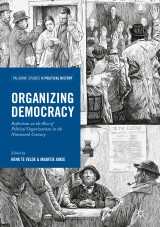Details

Organizing Democracy
Reflections on the Rise of Political Organizations in the Nineteenth CenturyPalgrave Studies in Political History
|
85,59 € |
|
| Verlag: | Palgrave Macmillan |
| Format: | |
| Veröffentl.: | 20.05.2017 |
| ISBN/EAN: | 9783319500201 |
| Sprache: | englisch |
Dieses eBook enthält ein Wasserzeichen.
Beschreibungen
<div>This book explores the new types of political organization that emerged in Western Europe and the United States during the nineteenth century, from popular meetings to single-issue organizations and political parties. The development of these has often been used to demonstrate a movement towards democratic representation or political institutionalization. This volume challenges the idea that the development of ‘democracy’ is a story of rise and progress at all. It is rather a story of continuous but never completely satisfying attempts of interpreting the rule of the people. Taking the perspective of nineteenth-century organizers as its point of departure, this study shows that contemporaries hardly distinguished between petitioning, meeting and association. The attraction of organizing was that it promised representation, accountability and popular participation. Only in the twentieth century did parties reliable partners for the state in averting revolution, managing the unpredictable effects of universal suffrage, and reforming society. This collection analyzes them in their earliest stage, as just one of several types of civil society organizations, that did not differ that much from each other. The promise of organization, and the experiments that resulted from it, deeply impacted modern politics.<br></div>
<div>1. Introduction: Perspectives on Political Organizing; Henk te Velde and Maartje Janse.- 2. ‘Association is a mighty engine’: Mass Organization and the Machine Metaphor, 1825-1840; Maartje Janse.- 3. 'Petition! Petition!! Petition!!!': Petitioning and Political Organization in Britain, c. 1800-1850; Henry Miller.- 4. Can 'The People' Speak?: Popular Meetings and the Ambiguities of Popular Sovereignty in the United States, 1816-1828; Reeve Huston.- 5. Law and Voluntary Association in the Early United States; Kevin Butterfield.- 6. Organizing in a Moment of Madness: Political Meetings & Clubs in 1848; Geerten Waling.- 7. The Democratic Framing of Protest in the Age of Revolution. The Language of Civil Rights and the Organization of Petitions and Demonstrations in Belgium, 1830-1848.- 8. Brilliant Failure: Political Parties under the Republican Era in France (1870-1914); Nicolas Roussellier.- 9. The German National Association 1859-1867: Rise and Fall of a Proto-Party; Andreas Biefang.- 10. Manipulation or Participation? Membership Inclusion in the Party Organizations of the German Social Democratic Workers’ Party and the British National Liberal Federation; Anne Heyer.- 11. Agitate, Educate, Organize: Radical Networks in New York in the Early 1880s; Robert Allen.- 12. Party versus Party: Beatrice Webb and the Ascent of the British Labour Party; Hanneke Hoekstra.- 13. The Domestication of a Machine. The Debate about Political Parties around; Henk te Velde </div>
<div><div>Maartje Janse is Lecturer of Dutch History at Leiden University, Netherlands. Her research focuses on popular participation in politics in Europe and the United States in the mid-nineteenth century. She has published books and articles on a range of topics including the origins and political implications of reform movements; abolitionism as a transnational phenomenon; and the development of protest repertoires. Janse has held visiting fellowships at Harvard and at the Netherlands Institute of Advanced Study and coordinates the Global Abolitionisms Network.</div><div><br></div><div>Henk te Velde is Professor of Dutch History at Leiden University, Netherlands. He has written a number of articles about the transnational study of parliamentary and political culture, published three books on comparative Dutch history, and many edited volumes. His most recent examines the history of British and French parliamentary rhetoric and culture in the nineteenth century, Sprekende politiek:Redenaars en hun publiek in de parlementaire gouden eeuw (2015). He has been visiting fellow and visiting professor in Paris, Oxford and Berlin, and is one of the founders of the international Association for Political History.</div></div><div><br></div>
<div>This book explores the new types of political organization that emerged in Western Europe and the United States during the nineteenth century, from popular meetings to single-issue organizations and political parties. The development of these has often been used to demonstrate a movement towards democratic representation or political institutionalization. This volume challenges the idea that the development of ‘democracy’ is a story of rise and progress at all. It is rather a story of continuous but never completely satisfying attempts of interpreting the rule of the people. Taking the perspective of nineteenth-century organizers as its point of departure, this study shows that contemporaries hardly distinguished between petitioning, meeting and association. The attraction of organizing was that it promised representation, accountability and popular participation. Only in the twentieth century did parties reliable partners for the state in averting revolution, managing the unpredictable effects of universal suffrage, and reforming society. This collection analyzes them in their earliest stage, as just one of several types of civil society organizations, that did not differ that much from each other. The promise of organization, and the experiments that resulted from it, deeply impacted modern politics. </p></div>
Presents a new perspective on political organizing in the nineteenth century Focuses on two competing models of organizing: 'direct’ democracy and permanent organization Challenges the idea that the development of ‘democracy’ is a story of rise and progress


















